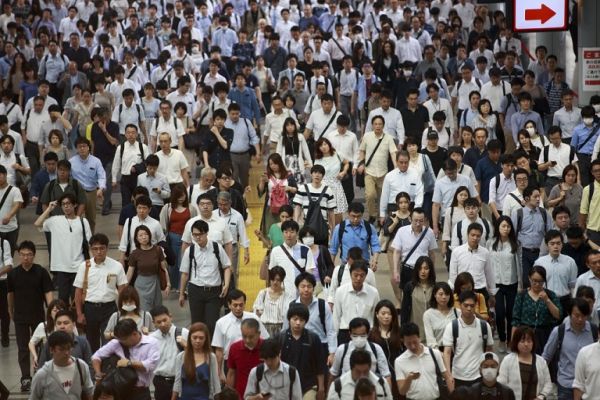Officials Tell Tokyo Workers To Stay Home In Fear Of Olympics Chaos
22nd July 2019
Officials also hope that promoting working from home during the Games will encourage a more easy-going approach in a country known for its cases of 'karoshi', or death from overwork

- Japan's famously diligent workers spend more hours at the office than employees in almost any other country. But to avoid traffic chaos at next year's Olympics, authorities have a message: stay home
- Hundreds of thousands of people are expected to attend Olympic and Paralympic events in Tokyo during the 2020 Games, putting additional strain on the city's already notoriously crowded commuter routes
- Experts expect a 10 percent rise in passengers on trains, and a 20 percent increase in express highway users, which could result in lengthy delays and even dangerous crowding
TOKYO, Japan-
Japan's famously diligent workers spend more hours at the office than employees
in almost any other country. But to avoid traffic chaos at next year's
Olympics, authorities have a message: stay home.
Hundreds of
thousands of people are expected to attend Olympic and Paralympic events in
Tokyo during the 2020 Games, putting additional strain on the city's already
notoriously crowded commuter routes.
Officials also hope
that promoting working from home during the Games will encourage a more
easy-going approach in a country known for its cases of 'karoshi', or death
from overwork.
"We are
expecting... up to 920,000 spectators and Olympic staff members a day,"
said Kasumi Yamasaki, who oversees transport issues for the Games at the Tokyo
Metropolitan Government.
RECOMMENDED
READ: Malian Forward Isamila Diarra Headlines AFC Leopards 7 New Signings
Experts expect a 10
percent rise in passengers on trains, and a 20 percent increase in express
highway users, which could result in lengthy delays and even dangerous
crowding.
Railway operators
are planning to put more trains into service but "railway transportation
is already at full capacity during the rush hours from 7 to 9am", Yamasaki
told AFP.
On July 22, one year
before the Games, Tokyo rolled out a month-long "Telework Days"
campaign, with government offices and private business committing to avoiding
peak commuting hours.
Nearly 3,000
companies including auto giant Toyota and trading house Sumitomo Corp. are
taking part.
The concept isn't
entirely unfamiliar in Japan, where the government has been urging employers to
be more flexible, hoping to help parents and others caring for elderly
relatives to better balance their work and home responsibilities.
DO
NOT MISS: Harambee Stars Coach Migne Optimistic Ahead Of Tanzania CHAN
Qualifier
The efforts have run
up against various obstacles, said Kanako Nakayama, an internal affairs
ministry official in charge of telework.
"Concerns over
the security of sensitive information, the difficulty of controlling working
conditions, and the fact that corporate culture stresses the importance of
face-to-face communications have deterred" some firms, she told AFP.
Officials hope the
campaign will show firms that employees can actually "work even more
effectively" when they stay home, she added.
